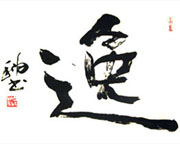Tai Chi for all - even in a wheelchair
Powerful Patient, 2009 Week 35Host: Joyce Graff, http://powerfulpatient.org, editor@vhl.org 800-767-4845
Two doctors share their experience using Tai Chi to help people maximize their health: Dr. Peter Wayne of Harvard University and Dr. Zibin Guo of the University of Tennessee at Chattanooga. Studies overwhelmingly point to regular physical exercise as the crucial medicine for what ails Americans. Physicians have a hard time convincing even healthy patients to take action, but it’s a much harder sell for those with limited movement caused by physical disabilities. Dr. Guo adapted the ancient Chinese martial arts, for the use of people with mobility limitations. His method is in widespread use in China. Dr. Wayne explains how he uses Tai Chi to ease the symptoms of a number of medical conditions, especially among women.
About our Guests
Peter Wayne, Ph.D. is an Assistant Professor in Medicine and Director of Tai Chi and Mind-Body Research Programs in Harvard Medical School's Division for Research and Education in Complementary and Integrative Medical Therapies. He founded and served as director of the Oriental medicine research program at the New England school of Acupuncture (NESA) from 2000 to 2006. His current research evaluates how Tai Chi, Qigong, and related mind-body practices clinically impact a variety of health conditions (osteoporosis, balance impairment, heart failure, pulmonary disease), and understanding the physiological, mechanical, and psychological mechanisms underlying mind-body practices’ therapeutic effects. Peter also has more than 30 years of training experience in Tai Chi and Qigong, is the founding director of the Tree of Life Tai Chi Center in Boston, and is an internationally recognized teacher of these practices.
Zibin Guo, Ph.D., is a medical anthropologist in The University of Tennessee at Chattanooga Department of Sociology, Anthropology, and Geography. A native of China, he has studied in China and at the University of Connecticut and Harvard University. He studies the ways that people of different cultures view wellness and illness. What is seen as a problem in one culture may or may not be seen as a problem in another culture. Much depends on one’s attitude toward ability and disability. Like Dr. Wayne, Dr. Guo is also a practitioner and instructor in the practice of Tai Chi.
About Tai Chi for holistic health
Tai chi is often described as “meditation in motion,” but it might as well be called “medication in motion.” This mind-body practice can help treat or prevent many age-related health problems, reports the May 2009 issue of Harvard Women’s Health Watch. And it may be the perfect activity for the rest of your life. You can get started with tai chi even if you aren’t in top shape. This gentle form of exercise is slow and doesn’t leave you breathless, yet it addresses the key components of fitness: muscle strength, flexibility, balance, and, to a lesser degree, aerobic conditioning. Harvard Women’s Health Watch reports the findings of various studies showing that tai chi combined with standard medical treatment can be helpful for several medical conditions:
Arthritis. An hour of tai chi twice a week for 12 weeks reduced pain and improved mood and physical functioning more than standard stretching exercises in people with severe knee osteoarthritis. Low bone density. Tai chi appears to be a safe and effective way to maintain bone density in postmenopausal women.
Breast cancer. In women suffering from breast cancer or the side effects of treatment, tai chi may help improve quality of life and functional capacity.
Heart disease. In one study, tai chi significantly boosted exercise capacity, lowered blood pressure, and improved levels of cholesterol, triglycerides, insulin, and C-reactive protein in people at high risk for heart disease.
Parkinson’s disease. A group of study participants with mild to moderately severe Parkinson’s disease showed improved balance, walking ability, and overall well-being after 20 tai chi sessions. Read the full-length article: "The health benefits of tai chi", at: See a video about Tai Chi at: Physical disabilities in general and severe ambulatory disabilities in particular not only bring a tremendous amount of physiological and psychological suffering to the individuals, they can also create enormous burdens for families, relatives, and friends, Guo says.
The University of Tennessee at Chattanooga professor has a fresh idea—wheelchair Tai Chi. Tai Chi is one of the ancient Chinese martial arts, a noncompetitive self-paced system of gentle physical exercise that Guo has adapted for wheelchair-dependent individuals in the U.S. and China. For his efforts, The Tennessee Higher Education Commission recently named Guo a faculty recipient of the state Love Award, recognizing his commitment to community service.
He says wheelchair Tai Chi is one of the simplest ways for people who use wheelchairs to improve their physical and mental health. His holistic approach has been embraced in China, where he was invited by the Beijing 2008 Olympic Committee and the All China Federation for People with Disabilities to conduct a wheelchair demonstration for the International Paralympics Committee one day before the opening ceremony of the 2008 Paralympics in Beijing.
As Dr. Guo says, it changes the way people look at the wheelchair itself – no longer as a confinement, but as a pair of dancing shoes.
In addition to the discussion in our show, you will find very interesting information and videos on the following website: http://www.appliedtaiji.com/
|
